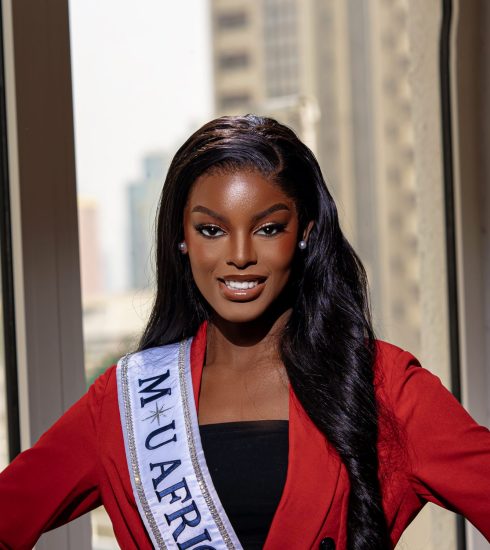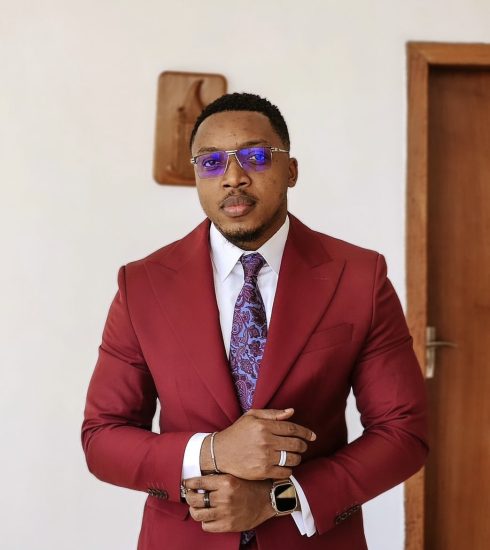Eku Edewor: A Producer’s Vision, An Actress’s Passion, A Star’s Journey
Movie producers in Nigeria play the role of architects in the film business, working tirelessly to create stories that amuse audiences while advancing the nation’s film industry. The driving force behind Nollywood’s rise to prominence worldwide is their commitment. Nigerian cinema’s storytelling skills are enhanced by the emergence of producers such as Eku Edewor, who play a crucial part in the industry’s growth.
Eku Edewor has had nothing less than revolutionary experiences in the film industry. Her work as a film producer has made a lasting impression throughout her more than ten years in the business. Her varied abilities go beyond the cinema, including acting, hosting, and presenting. Eku’s career is a monument to adaptability and commitment, from her appearance on Britain’s Next Top Model to producing, Breath of Life.
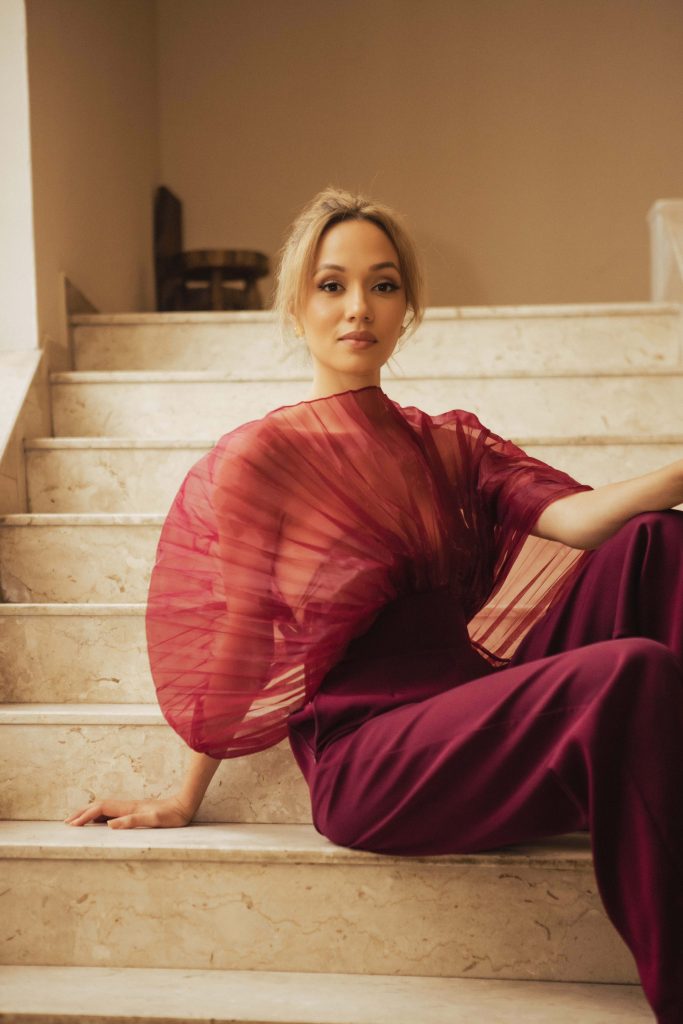
In this interview with THEWILL DOWNTOWN’s Dorcas Akintoye, Eku Edewor talks about the complexities of her journey as a film producer. She went on to talk about the plan to launch her production company. Delving into the creative process, she shares insights into her notable films like Flower Girl, A Sunday Affair, and more.
What initially inspired you to pursue a career in the movie industry and become a multifaceted media personality?
I always loved movies as a child, as did my whole family. My father recorded so many movies and shows on the VHS machine, and he has great taste, so I was an avid movie watcher and loved reading too. I found myself producing stage plays for my family as a child with my twin. The lighting, stage props, and costumes were all produced by us. We made so much effort to execute the vision. I don’t think that ever left me. My stepdad was a fan of the cinema, and my mother loved theatre, so that was another discovery through them. It was a world I just wanted to be a part of; the beauty of it all was also intoxicating to me. I got my break into film through University. I was the Arts coordinator for One World Week festival at Warwick University and ended up being hired by a Producer, Damian Jones, who I invited to showcase one of his films, and that’s how I officially got into it. I started as a producer’s assistant, and I guess the rest is history.
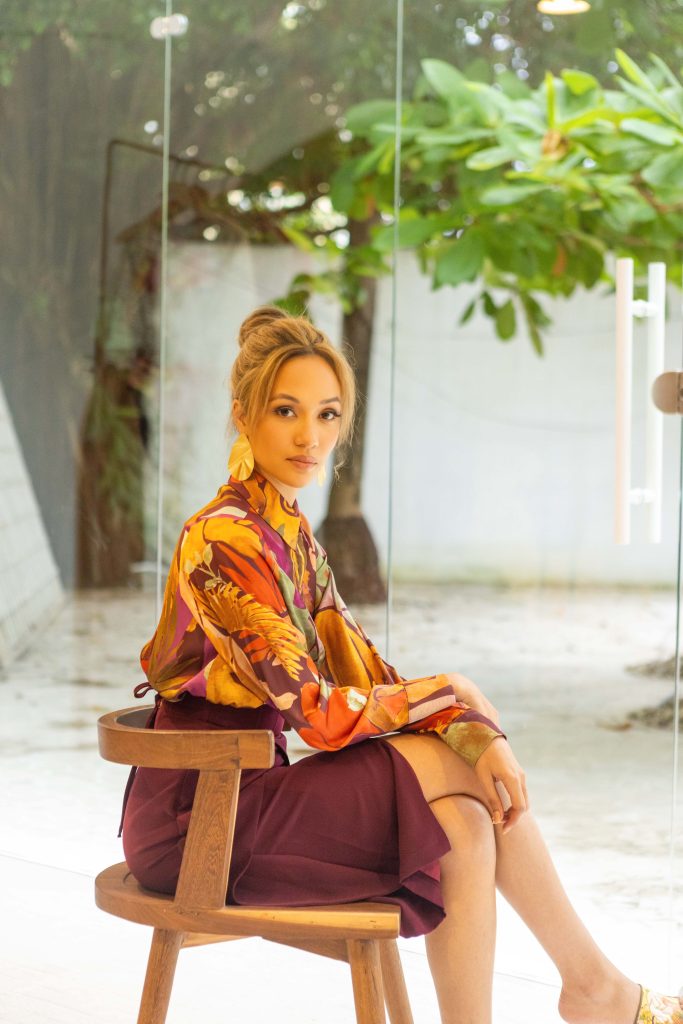
What challenges have you encountered as a film producer, and how have these challenges shaped your approach to producing movies?
I think all producers experience similar challenges all over the world, such as the availability of top cast, budget challenges, etc., but I think Nigerian producers deserve special medals as we make magic in spite of issues of working in a country that has many infrastructural challenges. Aside from traffic, power, petrol and diesel, which always puts weight on budgets, we don’t have affordable studios against the budgets we work with, limited location options as so many places don’t allow filming, funding, tight schedules, actors juggling sets as they can’t pass up work, they can’t afford to, equipment and skill scarcity for specialist work. We honestly are magicians when we create work locally that holds up to international standards.
What inspired you to venture into producing TV commercials, and how does the creative process differ from producing films?
BB Sasore and Derin Adeyokunnu, founders of Nemsia Films, asked me to produce a commercial.
I had helped them out with a previous one I was a part of, and I also assisted with a location for God Calling where we spoke extensively about my production background, which not many people realise I have. When they booked another commercial, Hero’s Echefula, which we shot between Enugu and Lagos, I said yes, and I kept saying yes.
The creative process of films and commercials is similar; the production process, however, is a little different. In a commercial, you’re producing a very high-value short film/ scene(s) that lasts a minute or a few minutes, with a budget that can usually achieve most of the demands of the concept. With films, you’re producing 90-180 mins of high-value content on a budget that is usually not adequate for the demands of the script, and you have to be creative, scrappy and pretty ingenious to figure it all out.
I have shot commercials that have had the same budgets as films I’ve produced.
How do you select the projects you want to produce, and what criteria do you consider when deciding to invest your time and energy into a particular film?
I’m currently about to launch my own production company, GET REEL Production, so I’ll be developing more of my own stories and concepts.
As a freelance producer, what’s important to me is the executives and partners I will be working with and for whether we have aligned goals. So, per example, I like to have a long prep period.
Will my partners give me that time? I also am a big collaborator creatively, so typically, I work well with directors who trust and lean on my support as a creative director. Also, at this point in my career, budget matters as I wish to do more challenging films and high-production-value projects that appeal to Nigerians and the world at large. Those usually require bigger budgets.
Having been part of Britain’s Next Top Model (BNTM) and later working as a production assistant, how did these early experiences shape your journey to becoming a producer?
Britain’s Next Top Model was the first time I understood the role of producers in creating what we see in front of the camera. So much is handled by production to bring together the final result. I think that I realised if I wanted to shape the outcome on screen, I had to be part of the process behind cameras. Working as Damian Jones’ assistant, I experienced what it is to be in the engine of a film, which is what production is: securing, hiring, casting, negotiating, scheduling, and putting all the parts together to execute production, which is as seamless as possible.
Flower Girl marked your first lead role, and you’ve produced several films since then. How has your experience as an actress influenced your approach to producing?
Truthfully, Flower Girl, being my first film in Nigeria, set a standard for how I expected every film experience to be; from casting to filming, it was all handled extremely well. Of course, we had long hours, but it was managed and well produced, and we were taken care of. I went on after that to be on other sets where the experience wasn’t as great, which was a fault of poor preparation and production; those experiences would deeply upset me. As someone who likes organisation, the chaos would drain me, and I thought to myself, I can run a better production than this. I try to prep as much as possible going into a production. I start on projects even before my contract begins, and I work with each department closely to make sure they are prepared. I constantly study makeup, costume, hair, production design, and I learn about cameras. I figure out on each production, who is the best at their job, and I build those relationships, because what I can control, I do. I like as little surprises as possible because there will always be surprises!
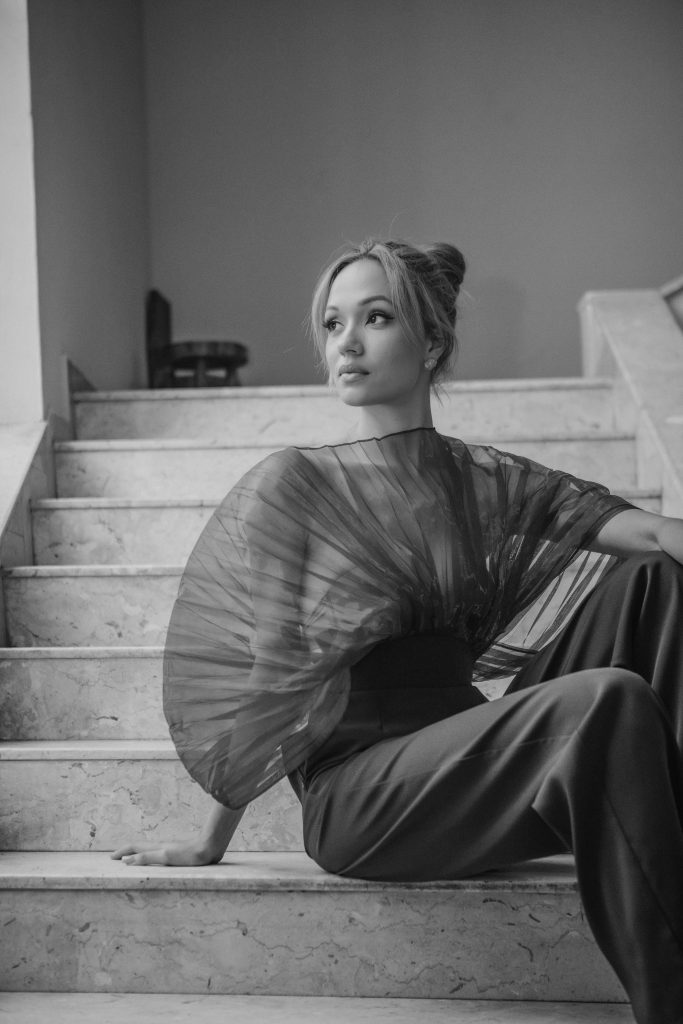
Castle and Castle is a Nigerian and Africa’s first legal series. What was it like playing the role of Nneka Amadi, and how do you think the series contributes to the representation of legal dramas in Africa?
Nneka is a character I am always grateful to have secured. She was a character I could really sink my teeth into. I don’t find I’m offered this type of character often, a Nigerian woman not defined by anything other than her grit, intelligence, skill as a lawyer and passion for her work. Nneka gave me confidence at a time when I needed a boost, and she taught me a lot. I think that the series set a standard for present-day legal dramas, and I really hope it gets renewed for another season, as it’s a cult favourite around the world. Nneka is the character I am most stopped by strangers to speak about whenever I travel.
In your extensive career, which acting role challenged you the most, and how did you grow as an actress through that challenge?
A short film Fractured on Ndani Tv directed by Bunmi Ajakaiye and produced by Abimbola Craig. I play a wife dealing with infertility in her marriage. I starred opposite the late Karibi Fubara, and it was so heavy we went through many emotions in a short time. I can barely watch it anymore as Karibi is no longer with us, but it holds a special place in my heart. I learnt how to cry from an honest place.
As a TV presenter, you’ve hosted shows like 53 Extra and Pepsi Top Ten Music Countdown. How do you balance the dynamic roles of presenting and producing?
I have taken a hiatus from presenting, aside from my MC work. I was actually burnt out after hosting 53 for 10 years. I lost the love of it, and I wasn’t excited to create that content anymore, so I stopped.
I’ve recently started doing little segments for my Instagram audience, Eku’s Edit and Style Reviews, which I am going to rename to Eku’s Extra Take, which the Instagram audience love, so maybe I will reignite the passion for presenting entertainment segments/ interviews again.
A Sunday Affair is a movie you recently starred in. Can you share your experience working on this project and your role as ‘Mrs Oyeyemi’?
I always love working on Ebony Life Productions.
They are extremely well-run, and the production value is high. I only had one shooting day, and I was allowed to play with my lines a bit as the character, although small, was important to the story, and I wanted her to have the right amount of impact, which they were graceful enough to allow me do.
She’s not on screen long, but you remember her. I love the Stanislavski phrase, “There are no small parts, only small actors”, and it’s my mantra as I’m frequently offered a lot of supporting roles. I like to think I always leave a lasting impression, even with a few appearances, because I will develop whatever character you offer me.
In your opinion, how has the landscape of the African movie industry evolved over the years, and what changes do you anticipate in the future?
This is my 13th year in the Nigerian Entertainment industry, and in that time, the African Film industry has really evolved. The scale of production has increased dramatically, especially with the introduction of streaming platforms willing to invest. Everyone has upped their game and is continuing to up their game. There’s a demand for better-produced content. We are a continent rich in many things, and our stories are plentiful. We have become better at telling our stories, which really resonates internationally. I see only progress in the future. I am an optimist, and I believe in the talent of Africa and what we have to offer. We are already competing with what we have, so you can imagine that the more people and institutions willing to support our growth, the greater our achievements in future.
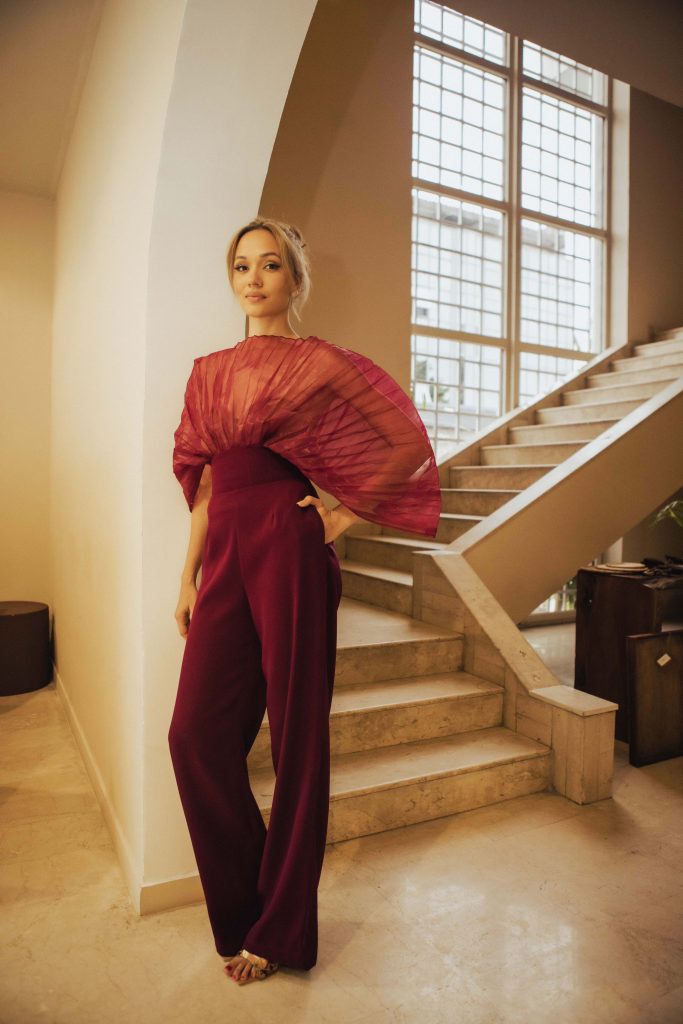
What role do you believe film and television play in shaping societal perceptions, and how does that influence your choices as a producer?
I think film is such a strong socio-political medium.
It reflects our world and can be the only insight some other parts of the world have into who and what we are as Nigerians. I think it’s important to think about your work’s messaging and the quality of the work when you consider this. I am in no way condemning any storyline or saying we shouldn’t explore topics that may make us look less than favourable, but we shouldn’t shy away from stories that focus on simpler and more profound stories that speak more broadly and represent us in more dynamic and honourable ways. Whatever story a filmmaker decides to tell, we should try to meet a production standard that is reflective of the collective manpower that it takes to make a film, whichever genre one chooses to play in. I’m not saying that all content needs to look like millions have been spent as not all films are for cinema or international platforms, but even low-budget films more for the local market should explore stories that don’t always focus on subject matter that is negative and try and offer the best production value one can.
How do you balance the creative aspects of filmmaking with the business side of production, considering factors like budgets, timelines, and market trends?
I define myself as a creative producer, which means I use my left and right brain all the time. I figure out how to deliver the demands of the script by being creative with options and solutions when we can’t afford first options. It’s my job to keep a film on budget, so I pride myself on getting the best deals and partnering with sponsors that will bring value and also brand place seamlessly. The way a film looks is also becoming a signature of mine; I love to create worlds that are beautiful to shoot, colours, texture, landscapes, clothing, etc.
I think you can’t be solely defined by trends; you have to make a film you passionately believe in and breathe life into it. Your passion reflects on the screen. I’ve always liked to embrace a distinct style, and my filmmaking isn’t any different. I want to inspire you with the beauty of Nigeria, its people and our uniqueness.
What advice would you give to aspiring actors and producers looking to make a mark in the entertainment industry?
I would advise them to keep showing up and be willing to take on any role to get a foot in the door and have a great attitude. I’ve hired based on willingness to learn over experience before. Watch all the best content globally, from all parts of the world, study your craft, and be open to new experiences.
Take courses whenever you have the opportunity, study the people you work with, learn to be useful on set (even as an actor), and don’t be entitled! You really don’t have to be a diva to make things happen.
Decide if you love films or if you want fame and money. Both are goals, but one will fulfil you, and the other will disappoint you. Be professional always, and don’t give up at the first few disappointments.
How do you balance your professional life in the industry and your personal life?
As a mum, I try as much as possible to show up for all important days.
I’m not hard on myself if I can’t make all pickups. The same applies to my friends; I make time for important fixtures in their lives, as you can really get lost in productions. I also give myself breaks between jobs and make up for lost time. Once I’m running a production, do not expect to see me, and if you need to see me, visit me on set or at home. I guess the answer is I make time, do my best and don’t beat myself up if I can’t do it all.
As a woman in the entertainment industry, have you faced any unique challenges, and how have you overcome them?
I think there are a few challenges we face as women in production.
Production is still quite male-dominated, if you look at the hire list for a film, if it’s a 60-person team, unless the hiring process is very intentional, which usually means a Female Head Producer/ Exec, about 10% of that number will be female, and most of the HOD’s are still male. This means that if you are in a leadership position, you are continuously having to earn the respect given to you where a man may not need to work as hard to get the same responsiveness.
If a male HOD is extremely assertive, per example, his team responds, unless the female in question has the trust of her team, if she’s overly assertive she’s seen as rude or disrespectful.
There’s also this constant misconception I’ve experienced that because I enjoy fashion, beauty and lifestyle that, I can’t possibly be the one doing the work on set, getting my hands dirty, running production day to day. People have asked, ‘does Eku really, produce, produce, is she the one?’ It’s extremely narrow-minded and can be frustrating because surely my work should speak for itself, yet the work is there, and you’re questioning how the work can be that good because I don’t look like I can run a production. I used to be very disappointed in how I was treated based on how I appear, but after some really tough experiences, I realised I was giving people too much power to affect me. The partners who believe in my talent and leadership champion my work and keep me employed. Of course, it can be hard if some of those people are gatekeepers, but if one gate shuts, I trust a windowkeeper will open.
Consistency wins. I’ve realised that we all have our challenges and blessings; everything in some way becomes a blessing, and I will use mine to my advantage, and the work will speak for itself.
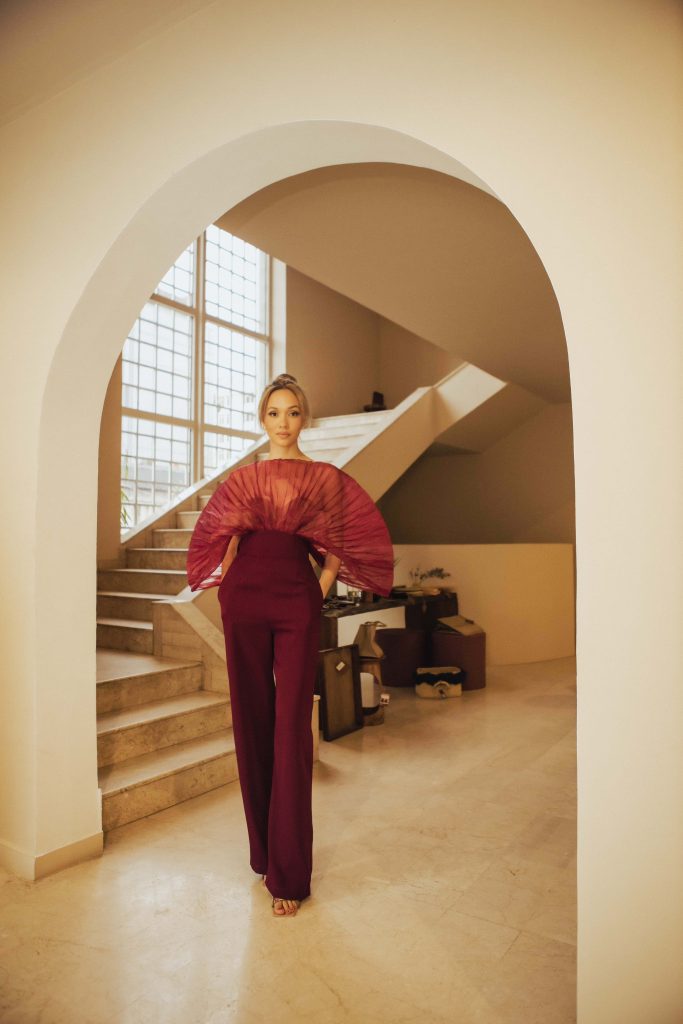
Looking ahead, what are your future aspirations and goals as a movie producer, and are there specific genres or themes you are eager to explore in your upcoming projects?
I would love to work on some really big-budget projects that allow us to create with fewer limitations. I want to continue to make films that resonate personally with local and global audiences. I do want to see a film I produce get critical acclaim at festivals, and I want to do that for myself personally and as a Nigerian.
I would like to make an action film with a female action lead, possibly myself! I love Columbiana, Salt, etc.
Looking back at your journey so far, what moments or achievements are you most proud of, and what are your goals for the future in the entertainment industry?
I’m proud that I have been working for the last 13 years. I haven’t given up, and I haven’t allowed my failures to define me, but they have inspired me to keep figuring out my role as a creative in this industry. In the future, I want Get Reel Production to be a household name synonymous with inspiring and quality content.
Do you have any producing projects we should expect to see in the future?
I just partnered with Inkblot on another film; this makes the 4th Film project I’ve done with them. This experience was different as I helped develop the story as well as Produce it. It’s a sports romance film called When love strikes my 2000s self, did cartwheels making this. I loved Bend it like Beckham, Love and Basketball, Coach Carter, etc, so the opportunity to make this film was a dream come true.
The next major film of mine to reach audiences will be Prime Video’s first Nigerian-commissioned Original, which I Produced for Nemsia Films. Breath of Life, will be out on Prime Video on the 15th of December. I produced and also have a role in this project, so please all stream it!
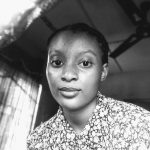
Dorcas Akintoye is a versatile writer with a passion for beauty, fashion, relationships, and culinary delight. With a keen eye for detail and a passion for storytelling, she adds a touch of elegance to every topic she explores. She is a writer at THEWILL DOWNTOWN.




